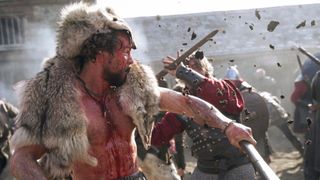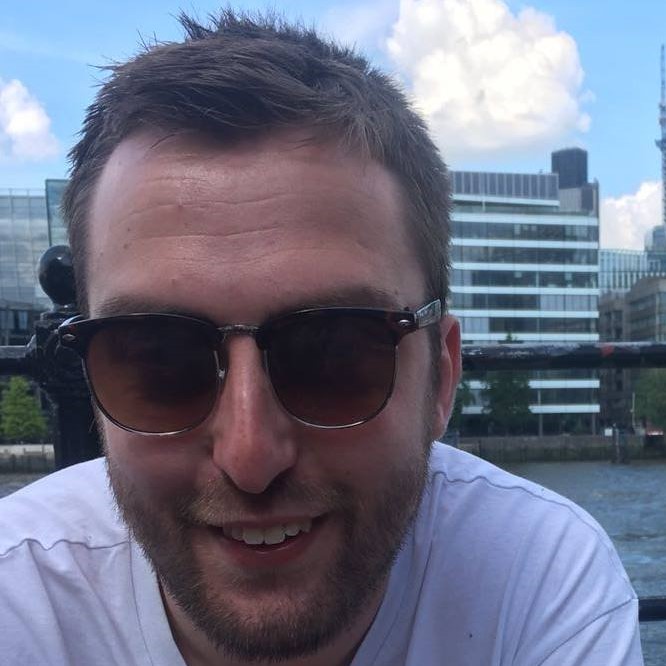The History Channel’s Vikings may have drawn to a close, but the story does not end with Ragnar, Lagertha, and Rollo. Set around 150 years later, Vikings: Valhalla is Netflix’s attempt to crack the Norse code and shape real-world legends into a gripping historical epic.
Vikings: Valhalla begins with the familiar: kings, rulers, and warriors vying for power. The setting and time period itself, however, is a little more obscure. A power-keg landscape in early 11th Century Europe is set off by the so-called St Brice’s Day Massacre, which saw potentially thousands of Vikings slain on November 13, 1002.
That Viking genocide on the order of England’s King Aethereld later gives way to invasion and warfare between the forces of England and Scandanavia, and forms the crux of the Vikings spin-off’s narrative. But you don’t need a working knowledge of that period, or of the original Vikings series, when entering the halls of Valhalla.
"What’s really great is Vikings: Valhalla is its own show entirely," Bradley Freegard, who plays the Danish monarch King Canute on the show, tells us. "And it's a fresh start building on what has gone before. You don't have to have seen any of the original Vikings series to come on board and start watching Vikings: Valhalla."
"But if you have watched all of it or you’re a big fan of the original Vikings show, then what you have there is a deeper interest and a lot of knowledge to fall back on…It’s good that we have all of that knowledge in the past and it’s been seen and known by the fans. We can use that and we can draw upon that."
Jóhannes Haukur Jóhannesson, who plays Jarl Olaf, adds: "We’re standing on [the original series’] shoulders and riding the machine." Frida Gustavsson (who portrays Freydis Eriksdottir in the Netflix series) shares that sentiment, but does temper caution: this is a very different beast entirely.
"I feel like we share a lot of the core DNA of the show, I feel like fans are going to recognise what they learned from Vikings. But they're also going to meet a new show," Gustavsson says. "I feel like new fans who maybe didn't see it, or maybe didn't like Vikings, are going to find that it is a standalone thing."
Gustavsson also mentions that she "was very inspired by Katheryn Winnick [who played Lagertha in Vikings] to carry the torch of this female lead, this badass female warrior."
Viking yin and yang
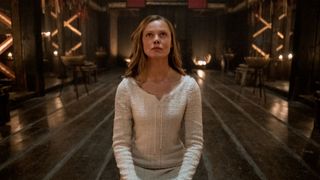
Valhalla, then, is certainly intent on setting out on its own voyage. Steering the ship are the dual leads of Leif and Freydis, two children of famed and feared warrior Erik the Red. Despite being linked by blood, however, the two differ in some key respects.
"They’re very different people," Gustavsson says. "They’ve taken on the legacy of Erik the Red, their father, quite differently. Where Freydis is forward, stubborn and resistant to change, Leif is more reflective. They have a yin and yang type of relationship, they learn from each other."
Sam Corlett, who plays Leif, agrees. "They’re both different sides of the same coin. They've had very similar experiences growing up in what I saw as a harsh environment of Greenland and under a harsh ruler, as a father, Erik the Red. I think in the ways Freydis may have admired Erik the Red and his way of being, Leif questioned it. And that kind of takes him on that journey."
It’s a journey that takes Greenlander Leif, along with King Canute and his forces, across the channel to England and to Kattegat, a settlement best known to Vikings fans as that show’s central location. In both settings, they come into contact with a whole host of power-hungry figures with minds just as sharp as the axes being gripped by the invading forces.
Among them is Emma of Normandy, the whipsmart wife of King Aethelreld and stepmother to heir apparent Prince Edmund. The one-time outsider has positioned herself firmly inside England’s court by the time the new series begins – and for good reason.
"She has extraordinary strength and intelligence and she has the ability to look behind people's masks, she knows their intentions, she knows their weaknesses," Laura Berlin, who portrays Emma, says of her character’s ability to outmanoeuvre her foes. "She is a very good strategist. She is a chess player. And that's really fascinating."
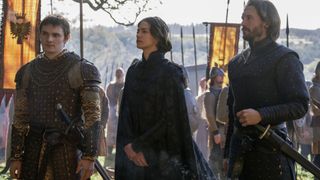
On the other side of the board, so to speak, is Godwin, the Earl who holds the ear of the king and, as we come to discover, the keys to the kingdom. His duplicitous nature belies some sort of warped desire to keep England ticking, according to actor David Oakes.
"I think he is loyal to a sense of what England could be," he says. "I think that is a sense of nationalism that isn't rooted in the past. And one that is aspirational, but also linked to a sense of familial survival."
Over in the port settlement of Kattegat, it’s Jarl Haakon who rules the roost amid an impending internal struggle between the Viking people. Her well-travelled, celebratory ways are often at odds with the Vikings who stab first and ask questions later.
"She's a very strong, fierce leader," Caroline Henderson says of her character. "[She has] this calmness and strength. Because she's not a young woman, I tried to portray her as somebody who's seen it all. She's been there. She's travelled all around the world. She's been back, she's been raiding. She speaks very passionately."
Haakon’s position also speaks to the show’s treatment of leaders. Namely, the ways to inspire a population are manifold. Where Haakon is open, Godwin works from the shadows; Emma of Normandy may have a way with words but, for someone like Canute – who is leading the charge to England – it’s his penchant for force that could turn the tide in his favor.
"He has been used to taking what he wants by force," Freegard observes. "Some of the other kings that may appear in the show have been quite comfortable for a long while and think that they can do as they please. They don't see the Vikings as so much of a threat anymore. And I think they ought to take it a bit more seriously."
A history lesson
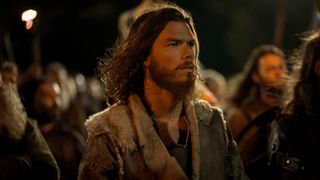
Despite its familiar trappings, diving back over a millennia can feel alien, even to the most skilled of actors. However, the ensemble were more than keen to hit the history books and contemporary works to get a feel for the distant age of yurts and jarls.
"I might have read a bit of Beowulf. I didn't read all of it. But yeah, I certainly dove into that history," Leo Suter, who plays headstrong Prince Harald, says. "Figuring out the kind of world that these Vikings lived in was important for me and a fun part of the job."
Corlett took a different approach in embodying the legend of Leif, who is believed to be one of the first Europeans to discover North America. That meant leaving some distance between himself and history.
"For me, it was not diving too deep into that, because obviously, he's considered a legend," Corlett says. "And he doesn't see himself as that. It's just a grounded individual who's just living out his life and doing the best he can for what he thinks is right. And so it was all about going there, but bringing it back down and coming back to the heart."
Berlin echoes those thoughts; her research for portraying Emma was essentially providing broad strokes, allowing the finer details to be built in her own performance.
"When you read these books [they] are more like suggestions, we know so little of that time," Berlin says. "We can only suggest. Another source [might be] slightly different. So it gives me as an actress enough room to create a whole new character and human being basically."
Oakes adds: "One of the main sources that we do have was actually paid for by Emma of Normandy. So if in any way Godwin comes across as a little bit slimy, that is wholly due to Emma of Normandy’s historical bias. He was charming, lovely, affable, kind, and loved goats."
Why we can't get enough of Vikings
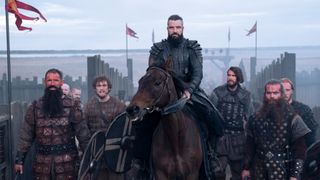
Alongside other historically popular eras, such as Romans or Egyptians, Viking influence seems to have a degree of permanence and influence in pop culture. In recent years alone, the Viking aesthetic (and period) has proved all-conquering: the Marvel movies with Thor, and the video games Assassin’s Creed Valhalla and God of War have all benefitted from a touch of Norse mythology and have been wildly successful. Why are we still up in arms about Vikings, well over 1000 years on?
"I think it's because it's far enough back in history that it's exotic," Gustavsson says. "It's just so deeply mythological. People, you know, are attracted to people that are adventurous, who are willing to risk themselves for greater causes. And what sets apart Vikings from all the others is that they were at the end of the day, great explorers."
Henderson points to the intriguingly progressive way in which women are portrayed in the Viking era compared to even much later historical periods.
"From a woman's point of view, if you go 100 years back, it's more difficult to see yourself in that context," she says. "But 1000 years, then you can see a woman be able to divorce, to marry, to own property, to do all this. You can relate to that on a different level. And that's very interesting."
And sometimes the straightforward answers are the best. "I think the Viking era, for better or worse, sums up everything that we're not allowed to be in the current age," Oakes adds.
Of course, Valhalla can’t whip up a storm on source material alone. For Jóhannesson, the series has one final, crucial ingredient that might help separate it from the legion of Vikings-related media that have proved prevalent over the years.
"It has a great script," he says. "I'm not saying the other shows don't have great scripts, but that's the one thing I find is most valuable with our show. And I was so happy when I got the scripts. They’re real page turners and that's always great as an actor when you get scripts that are really, really good."
He continues, "It reads so well that you just hope you’re able to capture it, put it together, and get it out there. That’s our greatest asset on Vikings: Valhalla: the fast-paced, intriguing scripts we have. They’re absolutely great."
So grab a tankard of mead and sharpen your bingeing battleaxe. It’s time to let Vikings: Valhalla regale you with tales of legends, guts, and glory when it hits Netflix on February 25.
